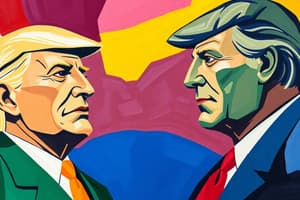Podcast
Questions and Answers
What does political efficacy refer to?
What does political efficacy refer to?
- The impact of media on political opinions
- The trust citizens have in government institutions
- The ability of individuals to influence political processes (correct)
- The effectiveness of the government in providing public services
Which of the following factors can undermine the legitimacy of a government?
Which of the following factors can undermine the legitimacy of a government?
- Effective public service delivery
- Economic crises affecting public welfare (correct)
- High levels of public participation in elections
- Transparency in government operations
How does corruption affect government stability?
How does corruption affect government stability?
- By eroding trust in government institutions (correct)
- By increasing government responsiveness to public needs
- By enhancing trust between citizens and government
- By stimulating economic development
What is one potential consequence of religious differences within a state?
What is one potential consequence of religious differences within a state?
Which issue can potentially enhance stability by leading to reform?
Which issue can potentially enhance stability by leading to reform?
Which country is recognized as a unitary state?
Which country is recognized as a unitary state?
Which of the following represents a primary advantage of a federal system?
Which of the following represents a primary advantage of a federal system?
What is one disadvantage of a unitary system?
What is one disadvantage of a unitary system?
Asymmetric federalism is primarily used to manage what?
Asymmetric federalism is primarily used to manage what?
What is a key characteristic of political legitimacy?
What is a key characteristic of political legitimacy?
Which source of legitimacy is primarily associated with Iran?
Which source of legitimacy is primarily associated with Iran?
How does the UK utilize devolution?
How does the UK utilize devolution?
What is one potential downside of federal governance?
What is one potential downside of federal governance?
Which of the following is NOT considered a source of power and authority?
Which of the following is NOT considered a source of power and authority?
Which country derives its authority primarily from a theocratic system?
Which country derives its authority primarily from a theocratic system?
What method is considered a peaceful way to change power and authority?
What method is considered a peaceful way to change power and authority?
Which of the following countries has experienced a transition from a monarchy to a constitutional parliamentary democracy?
Which of the following countries has experienced a transition from a monarchy to a constitutional parliamentary democracy?
What is a characteristic feature of a unitary state?
What is a characteristic feature of a unitary state?
Which factor is cited as influencing authority in Nigeria?
Which factor is cited as influencing authority in Nigeria?
Which of the following examples reflects a violent way to change power?
Which of the following examples reflects a violent way to change power?
What is one common element seen between Russia and China regarding governance?
What is one common element seen between Russia and China regarding governance?
Flashcards
Sources of power and authority
Sources of power and authority
The various factors that legitimize a government's actions and control.
Federal System
Federal System
A system of government where power is divided between a central government and smaller regional governments.
Unitary System
Unitary System
A government system where all the power is concentrated at the central level of government.
Peaceful change of power
Peaceful change of power
Signup and view all the flashcards
Violent change of power
Violent change of power
Signup and view all the flashcards
China's power source
China's power source
Signup and view all the flashcards
Iran's power source
Iran's power source
Signup and view all the flashcards
Examples of Change in Regime
Examples of Change in Regime
Signup and view all the flashcards
Federal State
Federal State
Signup and view all the flashcards
Unitary State
Unitary State
Signup and view all the flashcards
Devolution
Devolution
Signup and view all the flashcards
Asymmetric Federalism
Asymmetric Federalism
Signup and view all the flashcards
Political Legitimacy
Political Legitimacy
Signup and view all the flashcards
Sources of Legitimacy
Sources of Legitimacy
Signup and view all the flashcards
Maintaining Legitimacy
Maintaining Legitimacy
Signup and view all the flashcards
AP6 Federal Examples
AP6 Federal Examples
Signup and view all the flashcards
Political Efficacy
Political Efficacy
Signup and view all the flashcards
Undermining Legitimacy
Undermining Legitimacy
Signup and view all the flashcards
Corruption (Stability)
Corruption (Stability)
Signup and view all the flashcards
Separatist Movements (Stability)
Separatist Movements (Stability)
Signup and view all the flashcards
Economic Growth/Decline (Stability)
Economic Growth/Decline (Stability)
Signup and view all the flashcards
Study Notes
Sources of Power and Authority
- Popular elections
- Constitution
- Tradition
- Ideology (e.g., communism)
- Religion
- Nationalism
- Policy effectiveness
- Political efficiency
- Economic growth
- Charismatic leadership
AP6 Authority Sources
- China: Communist Party control
- Iran: Theocratic system, supreme leader
- Mexico: Democratic elections
- Nigeria: Democratic elections, corruption and military influence
- Russia: Semi-authoritarian government
- United Kingdom: Constitutional monarchy, parliamentary system
Comparing/Contrasting AP6 Authority
- Some AP6 countries (Russia and China) have strong centralized governments
- Others (UK, Nigeria, Mexico) are more democratic
- Iran's authority is based on religion
Peaceful/Violent Change of Power
- Peaceful: Elections, reforms, negotiations, constitutional amendments, peaceful protests
- Violent: Coups, civil wars, revolutions, armed conflicts
AP6 Regime Changes
- UK: From monarchy to parliamentary democracy
- Russia: Shift from communism to centralized state under Putin
- China: Communist Party consolidation after 1949
- Iran: Islamic Revolution, monarchy to Islamic Republic
- Nigeria: Military coups, diverse governments
- Mexico: Transition from one-party rule
Federal and Unitary Systems
- Federal state: Power divided between national and regional governments
- Unitary state: Centralized power at the national level
AP6 System Types
- UK: Unitary
- China: Unitary
- Iran: Unitary
- Mexico: Federal
- Nigeria: Federal
- Russia: Federal
Federal System Advantages/Disadvantages
- Advantages: Local governance, accommodates diversity, enhances political participation
- Disadvantages: Potential for conflict, complex governance, confusion for citizens
Unitary System Advantages/Disadvantages
- Advantages: Simplicity in governance, uniformity in laws, efficiency
- Disadvantages: May overlook local needs, reduce regional autonomy
Devolution
- Transfer of powers from central to regional/local governments
- UK uses devolution to give Scotland, Wales, and Northern Ireland their own parliaments
Asymmetric Federalism
- Different regions have varying powers
- Russia utilizes this for diverse regions
Political Legitimacy
- Right to govern, accepted by the public.
- Sources: Elections, law, tradition, ideology
AP6 Legitimacy Sources
- China: Military force, economic success, Communist Party, National People's Congress
- Mexico: Democratic elections
- Iran: Religious authority
- Nigeria: Military force, elections, despite corruption
- Russia: Strong leadership (Putin), nationalism, popular support, United Russia party, legislature
- UK: Constitutional monarchy, parliamentary democracy, tradition, legislatures, popular support
Maintaining Legitimacy
- Upholding the rule of law, fair elections, economic success, public services, maintaining order
Undermining Legitimacy
- Corruption, human rights abuse, lack of transparency, unfair elections, economic crises, failure to address public needs
Internal Actors Influencing Stability
- Corruption: Erodes trust in government (Russia, Nigeria)
- Separatist movements: Seek independence (UK, Scotland; Russia, Chechnya)
- Drug trafficking: Fuels violence (Mexico)
- Religious differences: Lead to conflict (Iran, Nigeria)
- Protest movements: Can enhance or threaten stability based on violence (Russia, Iran)
- Unfair elections: Cause unrest (Nigeria)
- Economic growth/decline: Growth enhances stability, decline threatens (China and oil-dependent countries)
Fragile State Index
- Measures a country's vulnerability to collapse
- Factors include political stability, social cohesion and economic performance.
- Higher scores indicate greater fragility; lower scores indicate better stability.
Studying That Suits You
Use AI to generate personalized quizzes and flashcards to suit your learning preferences.




